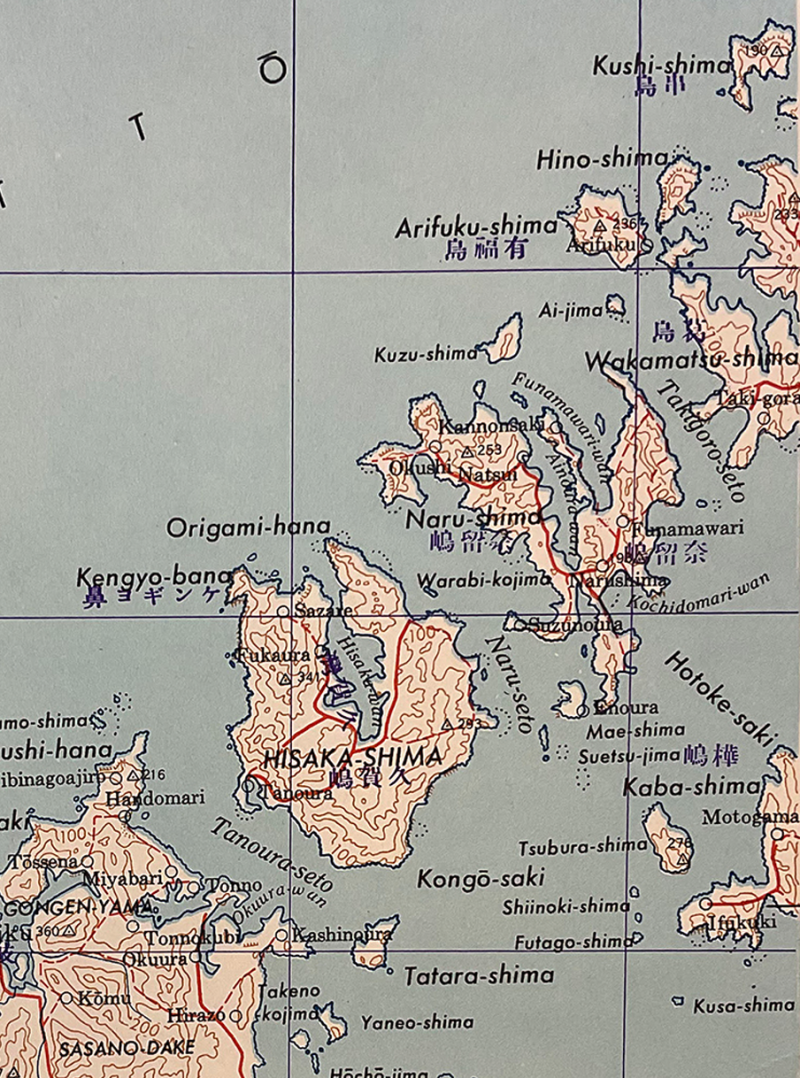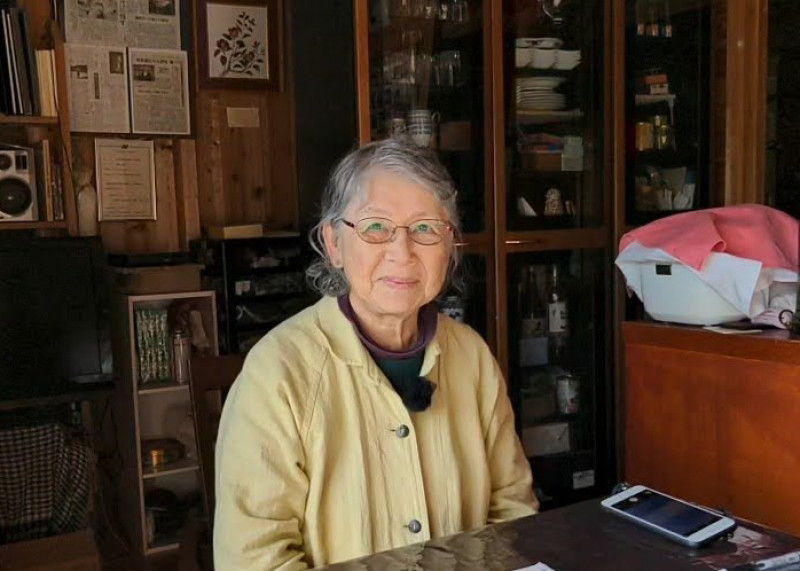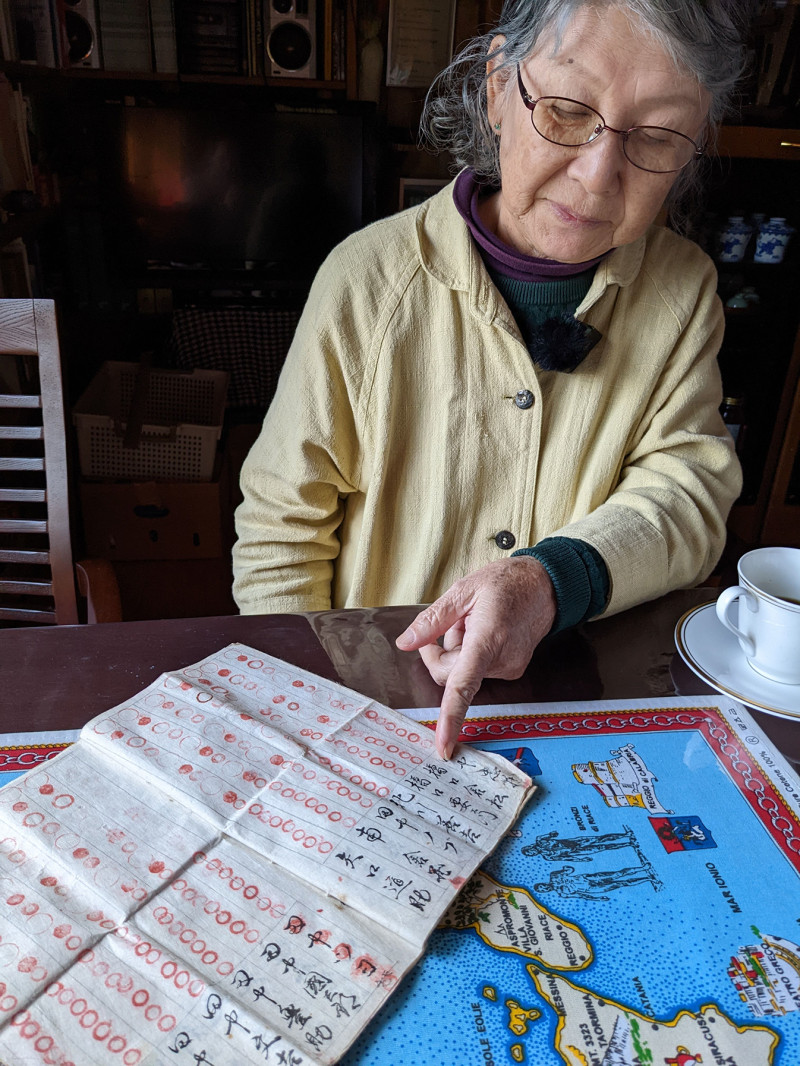
Urakami Sachiko
Settlers and the “Indigenous”

Date:
16 November 2022
Location:
Hidden Christian Resource Center, Akōgi, Naru Island, Lower Gotō Islands, Nagasaki Prefecture
Excerpt Length: Approx. 12 minutes
Participants:
Interviewer:
Gwyn McClelland (GM)
Interviewee 1:
Urakami Sachiko 浦上サチ子 (US)
Born Yagami, Naru Island, Shōwa 18 (1943). 79 years old at time of interview.
Also Present:
Kakimori Kazutoshi 柿森和俊 (KK)
Below is the transcript plus audio of an interview recorded on the Gotō Islands. Oral history consists of spoken memory. As it is personal opinion it is in no way intended to present the final verified or complete narrative of events. You are free to use the material in this transcript for research and study, education, other non-commercial or non-public purposes. You must not at any time do, permit, or authorise any act that infringes the copyright in the material. (e.g. By reproducing, publishing, performing, communicating, adapting, or entering into a commercial rental arrangement, or authorising a third party to do any of those things). Requests for further rights in respect of the materials (such as a right to publish, reproduce, broadcast or perform) may be made to Japan Past & Present.
English Transcript
To switch to the Japanese-language transcript, toggle the EN/JP option in the webpage's main menu.
[Section 1: Hints of Kakure Identity and Gendered Silences]
Urakami Sachiko
Ah, when I was at school, I'm not sure where [we had to write it] but, there were various [documents] on family formation and I think we had to write and submit various things. And at that point there was a "column" in which to write our religion. I had to write it myself but I was told you must not write Kirishitan… Kakure Kirishitan. "Write Buddhist!" they said.
That's what they said every time. After that year every year we had to submit it, every year they said that. And so, what on earth? I wondered why we wrote these lies? And at the time I was a child so I didn't understand it. I knew that there was something up, I had a vague idea but, they wouldn't tell me as a girl the details, so my eldest brother knew various things, like where we [our ancestors] came from, how we came here, and things like that he heard about …
Things that explained how we got to now but he was told not to even talk about it at home I think. So me and my brother got along really well – we were separated by twelve years but…
He would tell me various stories, read me books, for me, and at the time those stories gradually came to me. Our people did such and such, and came here. On Christmas eve we are going… he would say, and when I asked, what is this story? And he would forever go on about where we came from, how, in what circumstances we could do it, and that the elders told him this, I heard at the time. And so, aha, really? Wow, I would gradually become convinced. And, the fact that you couldn't talk about this with a girl: Why not with a girl? My curiosity had no bounds, because I was a child. And so, Why would they not explain to a girl? I thought at the time, maybe they couldn't tell a girl because they were chatterboxes! [laughs]

[Section 2: Bullying and Kakure Funerals]
Urakami Sachiko
And so there were less of socchi no hō ⋆ but, at the time to be a teacher in the school you could not be someone who had migrated [a hidden Christian], but [all] those who had been in the jimoto group became school teachers there so, whatever the case, my elder brother was bullied, bullied by a teacher, I heard. As I said before.
⋆ [the jimoto (original inhabitants)]
Gwyn McClelland
I see. Right, okay.
Urakami Sachiko
So, he could not answer back to the person who had an 'indigenous background.' If he did that he would be sat down on the ground, is what my brother said.
Gwyn McClelland
Yes.
Urakami Sachiko
And I caught glimpses within these kinds of things in what he told me. And I thought, oh, that makes sense! And so I gained the beginnings of a consciousness – that we were actually Kakure Kirishitan…
Gwyn McClelland
Was that when you were about twelve or thirteen?
Urakami Sachiko
Yes yes, about thirteen [years old], about then. Yes, I was a bit older than a primary student, maybe I was at junior high school…
Gwyn McClelland
Right. So as a child, when you were a small child. And you were told write, you can't write, and you heard that, is that when you thought, Ah, so I'm a Kirishitan?
Urakami Sachiko
Yes, that is right. Not so much that they said not to write it down, but why?... I wondered, what is the reason for this? That is all I thought. Because I didn't even know what Christianity was. At that stage.
So, there were special ceremonies that happened, and I knew a little bit about them. Like take the funerals, I hadn't seen a baptism however, but I had seen the funerals. When I think of it now, when we had a funeral we had a proper funeral procession, I think you say. And as well, we would wear a veil, I am a Roman Catholic and wear a veil, right? At the time, for a funeral procession, we wore 'white on our heads.' Yes, and they…
Gwyn McClelland
In the same way
Urakami Sachiko
Yes, that's right. A "veil," Um, and when I became an adult I realised – oh, those [white cloths] were used instead of veils.
I like Western films, and watch it a lot, but is it a tangent? [laughs]
Gwyn McClelland
Really? Its okay, no problem!
Urakami Sachiko
At the time when I was watching a Western film, as I liked these films for a long long time, since I was very young, anyway. And then when I watched a funeral, they throw a rock in the [coffin] hole and say "Go off to heaven," don't they? In foreign countries like Italy and in France, as well. That is what I saw them doing. And I remember that. We said “Yoka toko ike yo!” Which means right, "go off to heaven," I think. And that stuck in my head so strongly. To hear this, and I thought, oh, it really is Christianity!
Gwyn McClelland
Yes.
[Section 3: The Bible and Re-baptism]
Gwyn McClelland
Ahhhh, So, well, then, you went to a Catholic Church, from then did you?
Urakami Sachiko
I couldn't figure out what to do. I wondered about it. I already had a baptismal name as Maria and so, I received it as an infant and as a Kakure Kirishitan but because I had a baptismal name, what should I do, I worried about it for many years! But I couldn't determine a solution, what should I do and my partner in marriage, well they were a non-believer (irreligious) it seemed and so…
[My partner] didn't really agree with me about it either, so I continued to worry about it for a long time, and anyway, he died a while back, so…[laughs] [GM: Ahh] my husband!
Gwyn McClelland
Ah, really? Sorry.
Urakami Sachiko
So, he passed away and then there was no opposing person any more I thought, and I went to find out more, and keeping my baptismal name as it is, I was re-baptised. A priest told me it was better to change it, and to get rebaptised in a Roman Catholic way, he said, and so, the priest talked about it apparently, with his superior. And when I said I didn’t really know what to do they said what about being re-baptised? as a Catholic, so simply keeping my baptismal name the same, but receiving baptism as a Catholic, that's how I did it.
Gwyn McClelland
The same, the same, yes. Your baptismal name still as the same.
Urakami Sachiko
Yes, just the same, keeping my name the same, but I was re-baptised.
Gwyn McClelland
Different, the Catholic…
Urakami Sachiko
There are also priests who think you don't need to re-baptise. You’ve done it once, so no need to do it again.
Gwyn McClelland
Right.
Urakami Sachiko
It was like that.
Gwyn McClelland
Right. So that was after a long time? After a while?
Urakami Sachiko
So when I was baptised, how old was I?
Gwyn McClelland
Yes, what age were you when you accepted Catholic baptism?
Urakami Sachiko
Well you see. I worried about it for many years, so I was fifty-five years old.
Gwyn McClelland
Fifty-five. I see.
Urakami Sachiko
Yes, yes. But throughout that time I was reading the bible and other things. I thought it would happen some time so, I could give it up, I couldn't give up my name and I wouldn’t give up my Kakure Kirishitan name and I didn’t think I could be a Buddhist, and I wondered if some sort of religion was even necessary. At the time, I couldn't be [baptized]. Still, I was drawn strongly toward Catholicism. It was a strong [pull] all that time.
Gwyn McClelland
Right.
Urakami Sachiko
Yes, what was it? I read the new testament and the old testament time after time, back to front. And so, really, really, I thought maybe this is right, I should follow this I thought, until I was sure and so my baptism was much later but, even from much earlier, truly the time of my 20s, I wanted to do it, but…
But my job was busy, and because of a few things.
Gwyn McClelland
And your family?
Urakami Sachiko
My family didn't so much! [laughs]
Gwyn McClelland
Yes, I see.
Urakami Sachiko
They didn't really agree with it, and that lack of support was not good I thought, so because it was about religion, and things about the heart, I thought, and still it was okay not to have it in a particular form, so I still felt very much a Kakure Kirishitan within myself.
I wondered which one I would take up, but once I had seen over there [about the Kakure] to the extent I could, I could not make any sense of it, and so I thought I had to do this, this is what I had to do, I thought. And so, the Catholic side of things seemed to me to be easier. [laughs]
Gwyn McClelland
Right, I see.
Urakami Sachiko
Really, I could easily understand… it was not difficult I thought, in terms of faith, to some extent I could understand, after entering. It wasn't that for me, "I'm hurting, help me!" and enter in my case, that wasn't the case so, really I just wanted to understand, and so I read the bible time after time. And then I was able to go and be baptised. Finally.

[Section 4: An Emotional Memory]
Urakami Sachiko
No, not really. But, I want to mention something I think is amazing. Over there [across the harbour from Kakimori's house] in Yagami Shuraku, on the seaside, two families arrived there, and they wondered around that area aimlessly, this is a story I heard but they kept wandering around there saying would this be a good place, saying not here, but what about here? And they came up to the top of the rise, and then they decided to settle there and cultivate it [the area]. That, that, Isn't that fantastic? It really fills me up to here. It fills me up in my chest, it really does. Just hearing that [story] makes me start to cry…
[Section 5: Fish, a Guardhouse, and Settlers]
[GM had asked Urakami the question: Was there any discrimination or bullying of the Kirishitan?]
Urakami Sachiko
Yes, there was nothing that affected me but what I spoke about earlier of what my elder brother spoke of. There was that kind of thing I think. And as well, going back to discuss what happened previously, I don't know which period it actually was but, I heard about how you could not take things out of the sea from people from around here.
Gwyn McClelland
Oh, was it in that village also the case?
Urakami Sachiko
Yes.
Um, yes, for things stuck in the shallows, or on the rocks, and things that do not move. I think it was probably okay to take fish, but… They carefully put up a special shed, a house, or small shed that looked like a barn, a small house and there was always a guard person there, they said. "Don't take anything [they said], you must not take anything."
Gwyn McClelland
Really??? What could they not take?
Urakami Sachiko
Things of the sea.
Kakimori Kazutoshi
Mollusc shells, abalone.
Gwyn McClelland
Things of the sea. So, if it was fish, it was okay? Ah, I see.
Urakami Sachiko
Fish swim so they could be taken. Only fish could be taken but, those, yes, that's right - shellfish were attached so they could not take them.
Kakimori Kazutoshi
Or seaweed.
Gwyn McClelland
Really?
Urakami Sachiko
They could not take them.
Gwyn McClelland
Was this a story, or…?
Urakami Sachiko
I didn't see it myself, but who told me? It was what my brother told me. Yes, the guardhouse shed was put up here.
Gwyn McClelland
Right, I see.
Urakami Sachiko
And, that was why they didn't take them because there was a guard from among those people there.
Gwyn McClelland
Right. I see.
Kakimori Kazutoshi
And as well, one more thing but, for those who came here, they were called hiraki. Hirakimono was what they were called. The people who came across from Sotome were called hirakimono, [from the word] Hiraku.
Urakami Sachiko
hiraki, kaitaku, kaitakumin.
[short section removed]
Kakimori Kazutoshi
We were the kaitakusha (settlers). And the people who were here before they were called the jimoto-tachi, or the jimoto people. Anyway, the jimoto people bullied the kaitakusha.
The "settlers" were in the end [more than ourselves?], despised and the [jimoto] people discriminated against them. Yes, yes, yes. That is the link that explains what I said before. The things out of the sea could not… the things of the sea were not allowed to be taken and so on. That was the thing.
Gwyn McClelland
Ah, I see. That was discrimination - it really was.
Urakami Sachiko
It was bullying, wasn't it.
[End of Interview Excerpts]
Suggested Citation:
Urakami, Sachiko. "Urakami Sachiko: Settlers and "Indigenous." By Gwyn McClelland. Hidden Christian World Heritage in the Gotō. Japan Past & Present (16 November 2022).